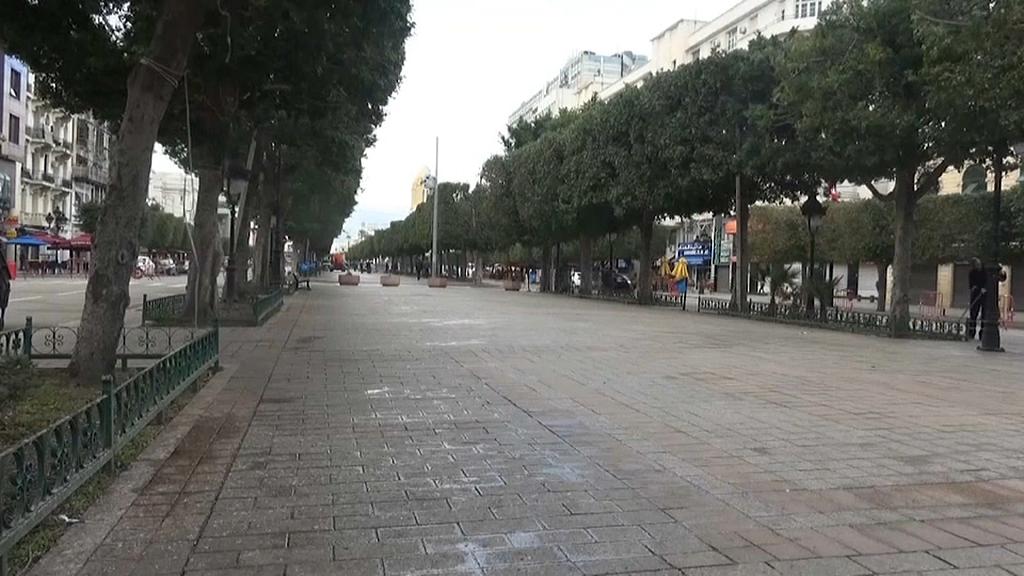Tunisia: Overturn Unjust ‘Conspiracy’ Trial Convictions

Beirut — End Sham Trial; Release Those Arbitrarily Detained
A Tunisian Court on November 17, 2025, is scheduled to hear the appeal of 37 people unjustly sentenced to heavy prison terms in a politically motivated “Conspiracy Case” from April, Human Rights Watch said today. Four of those detained are on hunger strike, including one who, according to his lawyers, was subjected to physical violence in prison on November 11.
The defendants were charged under numerous articles of Tunisia’s Penal Code and the 2015 Counterterrorism Law with plotting to destabilize the country. Human Rights Watch reviewed judicial documents in the case and found the charges to be unfounded and not based on credible evidence. The court should immediately overturn the abusive convictions and release all detainees, Human Rights Watch said.
“This entire case has been a masquerade, from the baseless accusations to a judicial process devoid of fair trial guarantees,” said Bassam Khawaja, deputy Middle East and North Africa director at Human Rights Watch. “The authorities should end this judicial farce, which is part of a wider crackdown on any form of criticism or dissent.”
On April 19, the Tunis Court of First Instance sentenced the 37 people, including opponents of President Kais Saied, activists, lawyers, and researchers, to prison terms ranging from 4 to 66 years for “conspiracy against state security,” and terrorism offenses. They were convicted after only three hearings without due process protections. Three more defendants have not yet been tried and are in proceedings before the Court of Cassation.
On October 24, defense lawyers learned that the first appeal hearing would be held remotely via videoconference on October 27. The detained defendants were only notified on the day of the hearing, and the other defendants did not receive a summons, a lawyer told Human Rights Watch. On October 27, the hearing was adjourned to November 17.
Jaouhar Ben Mbarek, a political activist sentenced in April to 18 years in prison, began a hunger strike on October 29 to protest his arbitrary detention. He has not received adequate medical care in detention, his lawyer and sister Dalila Msaddek said. The Tunisian League for Human Rights and several lawyers have raised concerns about his health, which prison authorities rejected. In a video posted on Facebook, Msaddek said that on November 11, her brother was taken to an area in Belli prison without surveillance cameras and violently beaten by six other inmates and five prison guards. He has bruises on his body and a broken rib, she said.
Politician Issam Chebbi and lawyer Ridha Belhaj, who were handed the same sentence as Ben Mbarek, began a hunger strike on November 7 and 8, respectively. Political activist Abdelhamid Jelassi, who was sentenced to 13 years in prison also started a hunger strike on November 10.
The April trial was held without the main defendants, depriving them of a real opportunity to present their defense. The Tunis Court of First Instance and the public prosecutor claimed “a real danger” and tried some defendants by videoconference. Most of the detained defendants refused to attend by video.
Judicial authorities also plan to conduct the appeal by videoconference, said the defense committee. The practice of remote hearings is inherently abusive, as it violates the right of detainees to be physically present before a judge who can assess the legality and conditions of their detention as well as their health. International human rights law, such as the International Covenant on Civil and Political Rights, states that everyone has the right to be present at their trial.
Twelve defendants are in detention. Some remain at liberty in Tunisia, and others abroad have been sentenced in absentia. Many of those convicted were initially arrested in February 2023 and held in abusive pretrial detention for more than two years, well beyond the maximum 14 months allowed under Tunisian law. A majority were taken before an investigative judge only once during that time.
The government has retaliated against defense lawyers in the case, further undermining defendants’ due process rights, Human Rights Watch said. On April 21, Ahmed Souad, a defense lawyer for some defendants, was arrested and charged with terrorism and “spreading false information” under the counterterrorism and cybercrime laws for questioning the independence of the judiciary following the trial. His trial was held without him, lasting just minutes, and the judge deliberated without hearing his lawyers’ pleadings. On October 31, he was sentenced to five years in prison and three years of administrative supervision.
Msaddek is set to appear before a Tunis court on November 25 for having spoken in a radio interview in 2023 in defense of her clients. She is accused of spreading “false information” and processing personal data under the cybercrime and protection of personal data laws.
In May 2023, Ayachi Hammami, previously a defense lawyer in the case, was added as a defendant, and sentenced in April to eight years in prison.
Following President Saied’s takeover of Tunisia’s state institutions on July 25, 2021, the authorities have dramatically intensified their repression of dissent.
Since early 2023, they have stepped up arbitrary arrests and detention of people across the political spectrum perceived as critical of the government. The authorities’ repeated attacks on the judiciary, including Saied’s dismantling of the High Judicial Council, have severely undermined its independence and jeopardized Tunisians’ right to a fair trial.
Tunisia is a state party to the International Covenant on Civil and Political Rights and the African Charter on Human and Peoples’ Rights, which guarantee the right to freedom of expression and assembly, to a fair trial, and to not be subject to arbitrary arrest or detention.
“Tunisia’s international partners should speak up against this flagrant injustice and assault on the rule of law,” Khawaja said. “They should urge Tunisian authorities to cease their crackdown, overturn these convictions, and guarantee fair trials.”
By HRW.



